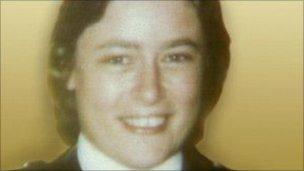Libyan denies Yvonne Fletcher murder involvement
- Published
Omar Sodani has denied any involvement in the shooting of Yvonne Fletcher
In a single chair in the middle of a windswept car park in Benghazi, Libya, is Omar Al Sodani.
For many years it's been thought that this man may have been involved with the death of Pc Yvonne Fletcher.
She was a 25-year-old police officer, shot dead whilst supervising a small demonstration outside the Libyan embassy in London in 1984.
Her death shocked Britain. The shots that killed her were fired from inside the embassy.
Not a suspect
Because of diplomatic immunity, the Metropolitan Police could not search the bags of the diplomats and staff who were subsequently deported.
The murder weapon was never found.
Omar Al Sodani was working as a translator for the Libyan embassy at the time.
After the shooting he was deported with the rest of the diplomats and at one point was rumoured to have been executed, or as he says "liquidated" - the term Col Gaddafi's regime used.
He is not suspected of shooting the police officer.

Libyan embassy staff claimed diplomatic immunity after Pc Fletcher was killed
It's a surreal experience to meet him this way - under armed guard, on a broken plastic chair in a dusty car park in the Benghazi suburbs.
His involvement as a member of one of Col Gaddafi's "revolutionary committees" led to his arrest, and means that the opposition will put him on trial here.
The opposition here are convinced of Mr Al Sodani's guilt and involvement in Pc Fletcher's murder, and while we are interviewing him, he is asked several times by their representatives to "admit" his guilt, or name the people who shot into the crowd on that day.
He is unruffled.
"People have been talking to me about Yvonne Fletcher for the last 20 years," he says.
"Naturally they [the rebels] would like to know the truth. They want to know if I was directly involved or not. I've explained several times that I was in police detention during the events."
He urged us to find the police records which he claims prove he was not in the embassy at the time of the shooting.
Despite his close links to the embassy, at the start of our interview, he denied having any idea who shot Pc Fletcher.
"I might tell an interrogator, but not a journalist."
But when pressed again and again, Mr Al Sodani says that several years later he was told that two students and one Libyan security officer had been on the floor from which the shots were fired.
"For many years we didn't talk about it," he says. "I decided to cut myself off from the past. I wanted to start a new life."
But what now for a man who was once thought to be the key to finding out what happened that day? Today he seemed resigned and ready to face trial here in Libya.
"I tell you that I am ready today to stand in front of justice," he says, "as far as this matter and any other matter is concerned."
He appears to have genuine faith in the system, although when he spoke he was surrounded by opposition representatives.
But the atmosphere was relaxed, and Mr Al Sodani showed no signs of fear or coercion.
The armed guard assumed a threatening pose when our cameraman started filming, but not before getting his friend to take a picture of him next to us.
After 20 minutes we're under pressure to leave but snatched a last question: Does he have any thoughts for Pc Fletcher's family?
"Of course I think about them all the time, but what could I have done?"
"I never thought there would be a shooting. It never crossed my mind that there would be a shooting of Yvonne Fletcher. Or anybody else that night."